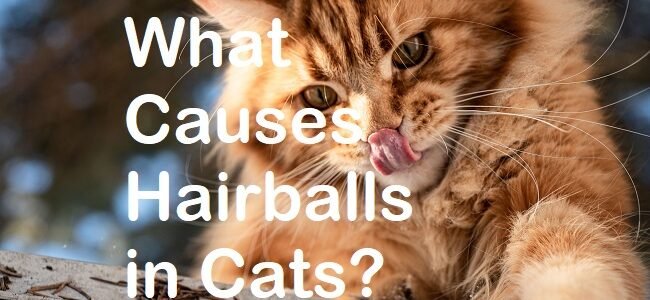Cats are remarkably skilled at keeping themselves clean and barely require bathing. While this innate behavior in cats helps their overall hygiene, it may pose a health problem for our feline friends. This leads to the what causes hairballs in cats?
 Cats love self-grooming from time to time. However, when grooming, they can swallow loose hair resulting in a cat hairball. Hairballs are usually harmless to cats.
Cats love self-grooming from time to time. However, when grooming, they can swallow loose hair resulting in a cat hairball. Hairballs are usually harmless to cats.
But if you are wondering what causes hairballs in cats, the symptoms, and how to help cats with hairballs, you would find this piece pretty enlightening.
What exactly is a cat hairball?
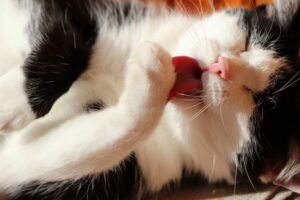
A cat’s hairball is a build-up of dead hair and digestive juices in the cat’s stomach. It is pretty standard for cats to swallow hair during grooming.
Every cat grooms itself by licking its fur. Their tongues contain tiny barbs that snag the strands as they shred. Due to the design of their barbs on the tongue that faces backward, cats have little choice but to swallow the hair they groom.
Typically, the hair swallowed usually passes through their body and gets eliminated. However, there are times when the hair is unable to make it past the intestinal tract.
Hairballs are pretty harmless but could become fatal if the hair becomes hardened and cause a blockage in their intestinal tract.
Hairball Control Recommended Cat Food Quick Review
| Product | Features | Cons | Price on AMAZON | Price on CHEWY | |
|---|---|---|---|---|---|
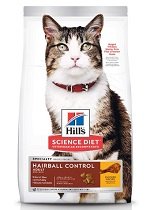 | Hill’s Science Diet Hairball Control Dry Cat Food | 4.5 STARS Vet recommended Clinically proven 1st Ingredient chicken meat No by-product meal Vitamins Omega 3 & 6 | Contains grains Kibble size large Picky eaters may not like |  | |
 | Hill’s Science Diet Hairball Control Wet Cat Food | 4.3 STARS Premium food Vet recommended 1st Ingredients real chicken & turkey Omega 3 & 6 Vitamins High fiber | Picky eaters may not like Unusual texture Pricier |  | |
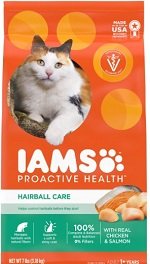 | Iams ProActive Health Adult Hairball Care Dry Cat Food | 4.6 STARS Complete & balanced nutrition Vet recommended No fillers First Ingredient chicken meat | Picky eaters may not like it |  | |
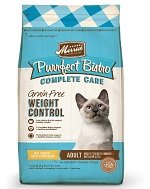 | Merrick Purrfect Bistro Grain Free Hairball Control Dry Cat Food | 3.7 STARS Omega 3 & 6 Complete Diet Antioxidants Probiotics Natural fiber No artificials 1st Ingredient real chicken meat | Picky eaters may not like Small kibble |  | |
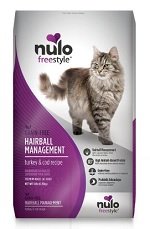 | Nulo Hairball Management Turkey & Cod Recipe Dry Cat Food | 3.5 STARS Grain free Omega 3 & 6 Probiotics Antioxidants First ingredient turkey meat Fiber- natural miscanthus grass. | Kibble very small Picky eaters may not like |  |
Symptoms of hairballs in cats
You may notice the following symptoms when your cat is trying to bring up a hairball;
- Retching
- Gagging
- Vomiting with food or fluid
- Dry cough
- Loss of appetite
- Swollen abdomen
- Diarrhea and constipation
- Weakness or lethargy
What Causes Hairballs In Cats?
A hairball is caused by loose hair that has been ingested but not passed through the intestinal tract.
Cats spend a lot of time licking and grooming their fur. The loose or dead fur that sticks to your cat’s tongue is swallowed, and the hair is digested and eliminated through the feces.
However, hair can build up in the stomach, forming hairballs. Your cat may vomit its hairballs with food or fluid.
Several factors such as extreme grooming, long coats, and shedding contribute to cats swallowing loose fur. The loose fur then turns into a hairball which may cause intestinal blockage in cats.
Excessive grooming and anxiety or allergens in cats
Cats develop hairballs when they groom. However, excessive grooming can signify anxiety in response to a sudden change in the cat’s environment.
Similarly, excessive grooming can also be a result of allergens or food sensitivities. So, if your cat is grooming too much, take your cat to a vet for a complete examination.
Hairball diagnosis in cats
You can detect if your cat has hairballs if you find vomit with hair, food, and fluid in it.
Similarly, loss of appetite, and lethargy associated with frequent vomiting with hair loss, could be an indication of intestinal blockage. To rule out any other condition, your veterinarian would conduct a physical exam to confirm the hairball.
Your vet would likely ask about your cat’s medical history and how frequently they cough up blood.
Several other blood tests and radiographs also are ordered by your veterinarian to check for an intestinal blockage in your cat. Although hairballs in cats are pretty harmless, an intestinal blockage could be fatal if left untreated.
Hairball treatment for cats
There are several available hairballs in cats. However, your veterinarian would recommend a treatment plan according to the severity of the condition.
Hairball preventative measures
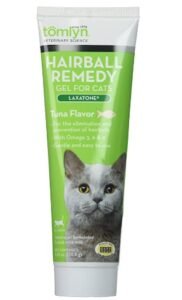
To keep hairballs at bay, your veterinarian may use a hairball preventative that serves as a lubricant. The product is designed to help your cat pass the hairball through the intestinal tract. An example of a hairball preventative is Laxotone.
· Brush your cat’s fur frequently
Because of the excessive grooming, your cat licks and swallows the loose hair. Therefore, brushing your cat’s hair several times per week will reduce the amount of hair she consumes. In addition, brushing the fur removes loose or dead hair before your cat can swallow it.
· Dietary Alteration
Changing your cat’s diet may help in passing and eliminating swallowed hair. Your veterinarian may recommend a fiber-rich diet. Fiber helps keep the digestive tract functioning, which felines need to pass swallowed hair through their body effectively.
· Surgical Extraction
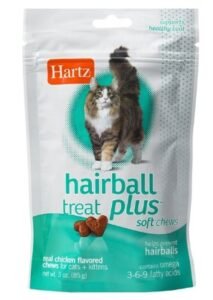
Based on the severity of the hairball, your vet may recommend surgery to remove the hairball from the intestinal tract. Surgery is only considered if the situation is complex and life-threatening.
· Discourage over grooming
Excessive grooming causes cats to swallow more hair, leading to more hairballs. If your cat spends too much grooming, try to break it up with a game or a cuddle. You may also want to give your cat a new toy to engage her in other grooming.
At what point do cat hairballs become dangerous?
Hairballs are generally harmless in cats. However, you should take your cat to the vet immediately if she displays the following signs;
- Extended gagging, retching without producing a hairball.
- Loss of appetite
- Lethargy
- Excessive nibbling on grass
- Lethargy
- Constipation and diarrhea
- Swollen or sensitive stomach
Ensure you provide urgent medical attention to your cat once you notice any of these disturbing signs.
Do some cats produce more hairballs than others?
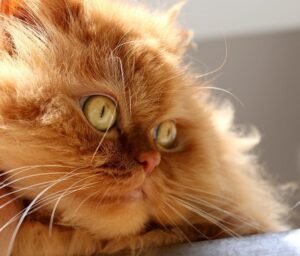
Cat hairballs are a natural part of their grooming routine and are usually not a cause for concern. Younger cats and kittens have fewer hairballs because they are less picky about grooming.
On the other hand, older cats may have become more selective and produce more hairballs. Although fluffy cats are excellent companions, they are more prone to frequent hairballs.
Some cat breeds, such as Persians and Maine coons, naturally produce more hairballs. The reason is that their hair accumulates into clumps rapidly.
How frequently do cats get Hairballs?
Hairballs should occur in cats occasionally, usually less than once a month. Most swallowed hair usually passes through the digestive system and comes with feces.
What Causes Hairballs In Cats? Final Thoughts
Cats love to stay clean by grooming. However, while grooming, they swallow loose hair, which becomes hairballs. While hairballs are harmless, they may pose a danger for your cat if it causes intestinal blockage.
Regular vet visits and constant brushing of your cat’s fur would help prevent any fatal consequences of grooming.

